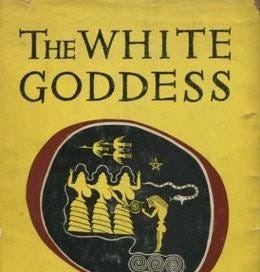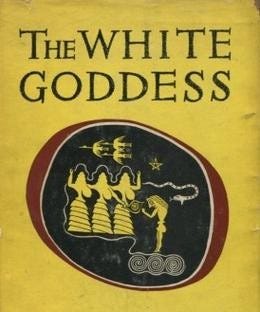By DAVID MYTON
Dear Subscribers - This is the second of my weekly Rambling On history posts - not my usual referenced, research-essay style. I’ll be publishing one of those in the next few days, focused on Postmodernism’s impact on the history discipline: oh, it’s been so much “fun” researching all those discourses, deconstructions, hierarchies, and subordinated power relation narratives! (said with irony, pomo-style).
Instead, I’m just going to ramble on: what I’ve been thinking about and/or reading in recent days (or, indeed, recent years). This is the first and only draft. Please feel free to chip in with (preferably nice, informative) comments.
What’s been on my mind this week is: Ancient goddesses and gods, Druids, runic alphabets, the mysteries of poetry, and an extraordinary writer/historian called Robert Graves.
Whenever I think of Ancient Rome (which, being of a nerdish disposition, occurs with some frequency) what comes to mind is me in the wilds of North Yorkshire in 1976 watching television.
For it was via that medium that I first encountered several Roman Emperors and a cavalcade of extraordinary centurions, foot soldiers, sages, poisoners and the poisoned, King Herod, orgies, murderers, schemers, lovers, and a horse called Incitatus who, being the bonkers Emperor Caligula’s favourite nag, had 18 servants and sported lots of jewellery.
I’m referring of course to a superb series called I, Claudius - based on the novel by Robert Graves - and which had been adapted for TV by Jack Pulman. It starred Sir Derek Jacobi who gave a ffff-fabulous performance as the stuttering, drooling, twitching (but secretly brainy) Claudius.
This was followed by Claudius The God (also adapted from the novel by Graves) in which Claudius becomes emperor, marries a nymphomaniac (Messalina) but still manages to govern Rome with some aplomb.
Having watched the TV series I bought Graves’s books and discovered that, man, this guy could write: poetry, fiction, fact, the whole package.
Poetry performance group
In those days I used to write poetry (some of which was published in magazines that hardly anyone read) and I also formed part of a “poetry performance” group with a few friends. We did gigs in arts centres and theatres in the north of England, reading our poems backed by a pianist and a couple of guitarists. I loved that. I loved poetry (still do).
And so it was that I discovered Graves had written a book I’d never before heard of - one of the weirdest, most complex, baffling, enchanting and exciting (for a nerd) that I have ever read.
It is called The White Goddess. A historical grammar of poetic myth (Faber & Faber, London, 1948)
This is part of Graves’s Dedication at the very beginning of the book:
It was a virtue not to stay,
To go my headstrong and heroic way
Seeking her out at the volcano’s head,
Among pack ice, or where the track had faded
Beyond the cavern of the seven sleepers:
Whose broad high brow was white as any leper’s,
Whose eyes were blue, with rowan-berry lips,
With hair curled honey-coloured to white hips.
Green sap of Spring in the young wood a-stir
Will celebrate the Mountain Mother,
And every song-bird shout awhile for her;
But I am gifted, even in November
Rawest of seasons, with so huge a sense
Of her nakedly worn magnificence
I forget cruelty and past betrayal,
Careless of where the next bright bolt may fall.
Who cleft the Devil’s foot?
Graves acknowledges the book’s oddness, adding: “but then of course a historical grammar of the language of poetic myth has never previously been attempted, and to write it conscientiously I have had to face such puzzling questions” such as “what song the Sirens sang, or what name Achilles assumed when he hid himself among the women”, and “many questions of the same sort”, including:
Who cleft the Devil’s foot?
When did the Fifty Danaids come with their sieves to Britain?
What secret was woven into the Gordian knot?
Why did Jehovah create trees and grass before he created the Sun,
Moon and stars?
Where shall Wisdom be found?
Graves warns readers that “this remains a very difficult book, as well as a very queer one, to be avoided by anyone with a distracted, tired or rigidly scientific mind”.
His thesis, he writes, is that the language of poetic myth was a “magical language bound up with popular religious ceremonies in honour of the Moon-goddess, or Muse, some of them dating from the Old Stone Age, and that this remains the language of true poetry - ‘true’ in the nostalgic modern sense of the ‘unimprovable original, not a synthetic substitute’.”
Over time this language was tampered with in the late Minoan era when invaders from Central Asia “began to substitute patrilinear for matrilinear institutions and remodel or falsify the myths to justify social changes”.
The early Greek philosophers, he writes, were “strongly opposed to magical poetry as threatening their new religion of logic, and under their influence a rational poetic language (now called Classical) was elaborated in honour of their patron Apollo and imposed on the world as the last word in spiritual illumination: a view that has prevailed … in European schools and universities, where myths are now studied only as quaint relics of the nursery age of mankind”.
(So maybe the Postmodernists are right: it is all about the metanarratives and the dominant discourse etc?!)
One of the most uncompromising rejections of Greek mythology was by Socrates … “Myths frightened or offended him; he preferred to turn his back on them and discipline his mind to think scientifically: to investigate the reason of being of everything - of everything as it is, not as it appears, and to reject all opinions of which no account can be given”.
The fact was, writes Graves, by Socrates’ time the sense of most myths belonging to the previous epoch was either forgotten or kept a close religious secret …
“When invited to believe in the Chimaera, the horse-centaurs, or the winged horse Pegasus, all of them straight-forward Pelagian cult symbols, a philosopher felt bound to reject them as a-zoological improbabilities ...”
The Song of Amergin and the Chief Bard
Graves goes on to examine the Song of Amergin, “said to have been chanted by the chief bard of the Milesian invaders, as he set his foot on the soil of Ireland, in the year of the world 2736 (1268 BCE)”
Here follows some extracts of this poem:
I am a hawk on a cliff,
I am a tear of the sun,
I am fair among flowers
I am a salmon in a pool
I am a hill of poetry
I am a battle-waging spear,
I am a god who forms fire for a head …
This is followed by five more lines in the form of a chant, from The Song of Amergin:
Invoke, People of the Sea, invoke the poet, that he may compose a spell for you.
For I, the Druid, who set out letters in Ogham,
I, who part combatants,
I will approach the wrath of the Sidhe
To seek a cunning poet that together
we may concoct incantations.
I am a wind of the sea.
I love those last three lines, they give me a shiver down the spine.
Anyway, there are hundreds more pages of this kind of thing as Graves delves away in his bid to find the secret of poetic inspiration. I don’t think he finds it exactly, but it’s worth the journey.
As the Druid said:
I have been a wave breaking on the beach.
On a boundless sea I was set adrift.
Myths and legends … and history
Interestingly we find myths and legends seamlessly woven into some of the early so-called factual “histories” of England.
For instance Geoffrey of Monmouth in his 12th century The History Of The Kings Of Britain narrates how a warrior called Gogmagog, some 12 feet tall (3.6 metres) was able to rip fully grown Oak trees out of the ground, which came in handy when in battle. An inhuman giant monster attacks King Arthur but Arthur slays him, chopping off his head. And an ingenious necromancer named Bladud constructed some wings for himself, flew in the “upper air” before crashing onto the top of the Temple of Apollo in the town of Trinovantum “and was dashed into countless fragments”.
In A History Of The English Church and People, the Venerable Bede records a “noteworthy miracle” when a “man already dead returned to bodily life” and narrates how the Devil had given him a personal guided tour of Hell.
“I saw a throng of wicked spirits dragging with them five human souls howling and lamenting in the depths of darkness while other devils laughed and exulted … Meanwhile, some of the dark spirits emerged from the fiery depths and rushed to surround me, harassing me with their glowing eyes and foul flames issuing from their mouths and nostrils”.
Where were Bede’s fact checkers, that’s what I want to know.
Anyway, that’s enough rambling from me …
References
Robert Graves, The White Goddess. A historical grammar of poetic myth (Faber & Faber, London, 1948)
Bede, A History Of The English Church and People, Penguin Classics, 1955 (Translated by Leo Sherley Price)
Geoffrey of Monmouth, The History Of The Kings Of Britain, Penguin Classics, 1966 (Translated by Lewis Thorpe)





Thank you for rambling! Having read thousands of books during my lifetime, I can say that Graves White Goddess is one of the few that has altered the way I view the world. I don't pretend to understand it all or even most of it in the thirty or so years since I first read it but there is something about the subject and the language that has opened doors for me.
Perspicacious as always, and the well chosen quotes make me wonder what the hell I was reading in school to have missed so much. I think you need to write down the top 50 books you think we, mere mortals who admire your rambles, need to make certain we have read. I would appreciate that gift, though your “rambles” are certainly gift enough. Thank you and looking forward to the next!